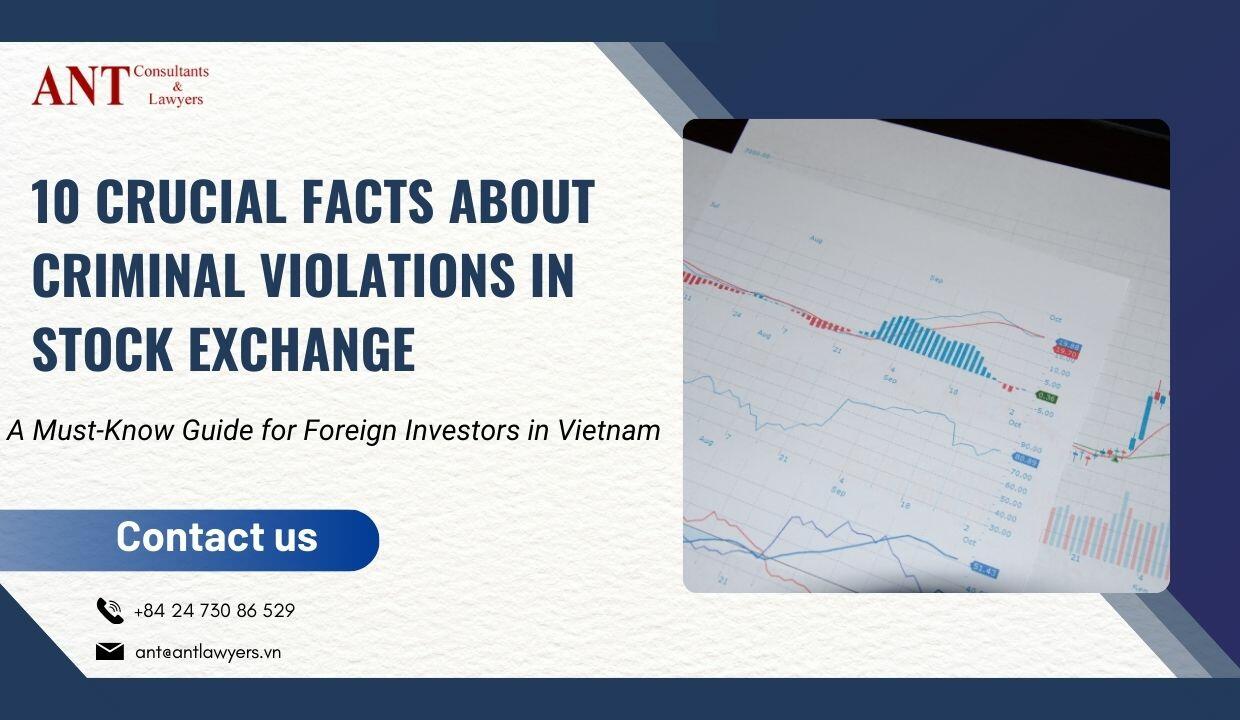Navigating Compliance in Vietnam’s Stock Market
Vietnam’s stock market has become a key destination for foreign investors due to its rapid growth and significant opportunities. However, this dynamic environment comes with a complex regulatory framework that demands strict compliance. Violations of securities laws, especially criminal offenses, can lead to severe legal and financial consequences, tarnishing reputations and disrupting business operations.
As Vietnam strengthens its enforcement of securities laws, foreign investors must be well-informed about potential risks and ensure their trading activities align with local regulations. Criminal violations in stock exchange activities—such as insider trading, market manipulation, and providing false information are treated seriously under Vietnamese law, with penalties ranging from substantial fines to imprisonment.
In here we discuss Vietnam’s stock market regulations, avoid common pitfalls, and ensure compliance and provide insights into critical legal requirements and practical strategies to navigate Vietnam’s securities market responsibly.

Why Compliance Matters in Vietnam’s Stock Market
Vietnam’s stock market is governed by stringent laws designed to promote transparency, fairness, and investor protection. Non-compliance not only exposes businesses to legal risks but also undermines investor confidence and market stability.
For foreign investors, understanding and adhering to these regulations is crucial. The penalties for criminal violations in stock exchange activities can be severe, including:
- Fines ranging from millions to billions of VND.
- Imprisonment of up to seven years for individuals.
- Operational restrictions or shutdowns for corporate entities.
Compliance isn’t just about following rules; it’s a key component of sustainable success in Vietnam’s growing financial market.
Key Regulations Governing Securities in Vietnam
The primary legal framework for Vietnam’s stock market includes:
- The Law on Securities: Establishes rules for securities offerings, trading, and investor protection.
- The Criminal Code: Defines criminal liabilities for violations in securities activities.
- Decrees and Circulars by the Ministry of Finance and the State Securities Commission (SSC): Offer detailed guidance on compliance and penalties.
Foreign investors are strongly advised to familiarize themselves with these laws to avoid inadvertent criminal violations in stock exchange activities.
Types of Criminal Violations in Stock Exchange in Vietnam
Vietnamese law recognizes several criminal offenses related to securities activities. Below are the key violations and their corresponding penalties:
Providing False Information or Concealing Facts
Deliberately providing false information or omitting critical facts during securities activities—such as offerings, listings, or trading—is a serious crime.
Penalties:
- Fines up to VND 2 billion.
- Imprisonment of up to five years for individuals.
- Corporate fines up to VND 5 billion and possible bans on operations.
Insider Trading
Using non-public, material information for securities trading is strictly prohibited.
Penalties:
- Fines ranging from VND 500 million to VND 2 billion.
- Imprisonment of up to three years for individuals.
Market Manipulation
Engaging in practices that distort market prices or create artificial supply and demand is considered a criminal offense.
Penalties:
- Fines up to VND 4 billion for individuals.
- Imprisonment of up to seven years.
- Corporate entities may face fines up to VND 10 billion or operational bans.
Forging Documents in Offering or Listing Profiles
Falsifying documents during securities offerings or listings is a criminal act.
Penalties:
- Fines up to VND 2 billion.
- Imprisonment of up to seven years.
- Additional bans on professional activities.
The Role of Regulatory Bodies in Vietnam
Vietnam’s stock market is overseen by key institutions that work to maintain market integrity:
- The State Securities Commission (SSC): Responsible for monitoring compliance and investigating violations.
- The Ministry of Finance: Ensures policy enforcement and market oversight.
- Stock Exchanges (HOSE, HNX, UPCOM): Monitor daily trading activities to detect irregularities.
Collaborating with these entities and understanding their expectations can help foreign investors avoid criminal violations in stock exchange activities.
Challenges in Prosecution and Enforcement
Enforcement of securities laws in Vietnam faces challenges, particularly in cases like insider trading. Gathering evidence, proving intent, and tracing transactions often require advanced tools and expertise.
Foreign investors should note that investigations into criminal violations in stock exchange activities can be complex and time-consuming, potentially disrupting operations even if no wrongdoing is ultimately proven.
How to Avoid Criminal Violations in Stock Exchange Activities
Understand Local Laws
Familiarize yourself with Vietnam’s securities regulations and stay updated on changes. Consulting legal experts is essential to interpret and apply the rules effectively.
Implement Robust Compliance Programs
Companies should establish internal systems to monitor trading activities and ensure employees comply with legal and ethical standards.
Engage Local Advisors
Working with experienced securities lawyers can help identify potential risks, review transactions, and resolve compliance issues promptly.
The Cost of Non-Compliance
Several high-profile cases in Vietnam illustrate the consequences of criminal violations in stock exchange activities:
- Market Manipulation Scandals: Executives have faced significant fines and imprisonment for inflating stock prices using fraudulent methods.
- Insider Trading Allegations: Although convictions remain rare, increased regulatory scrutiny suggests a stronger focus on enforcement.
These prominent cases are not difficult to find recently in Vietnam highlight the importance of proactive compliance measures for foreign investors in Vietnam.
The Importance of Ethical Practices
Ethical behavior and transparency are critical to building trust with investors, regulators, and the market. By adhering to high standards, foreign investors can reduce risks and enhance their reputation in Vietnam’s competitive financial market.
Future Trends in Stock Market Compliance
Vietnam is aligning its securities regulations with international best practices, focusing on:
- Advanced technology for market surveillance.
- Stricter penalties for criminal violations in stock exchange activities.
- Enhanced corporate governance and ESG compliance.
Foreign investors should be prepared for stricter regulatory scrutiny and prioritize compliance to remain competitive.
Looking Ahead: Ensuring Long-Term Success
Vietnam’s stock market offers immense opportunities, but navigating its regulatory environment requires diligence and expertise. Understanding and avoiding criminal violations in stock exchange activities is essential for protecting your investments and ensuring sustainable growth.
About ANT Lawyers, a Law Firm in Vietnam
We help clients overcome cultural barriers and achieve their strategic and financial outcomes, while ensuring the best interest rate protection, risk mitigation and regulatory compliance. ANT lawyers has lawyers in Ho Chi Minh city, Hanoi, and Danang, and will help customers in doing business in Vietnam.
How ANT Lawyers Could Help Your Business?
You could reach ANT Lawyers in Vietnam for advice via email ant@antlawyers.vn or call our office at (+84) 24 730 86 529





